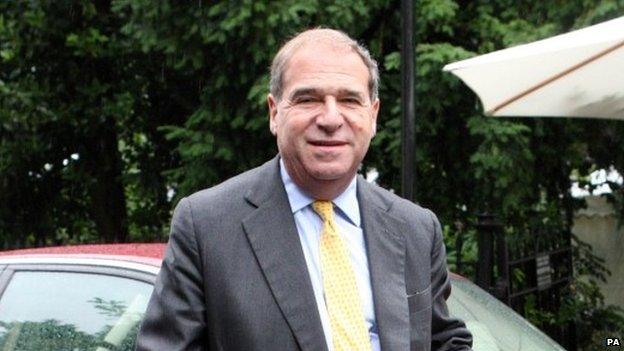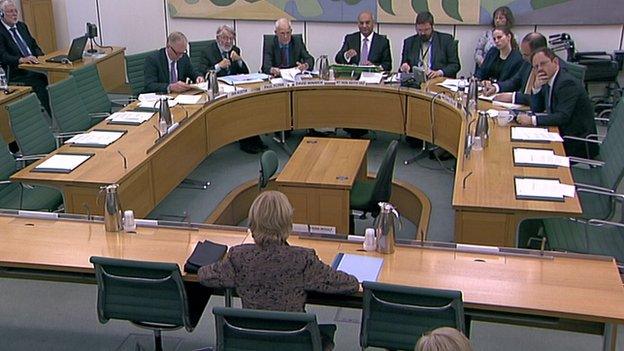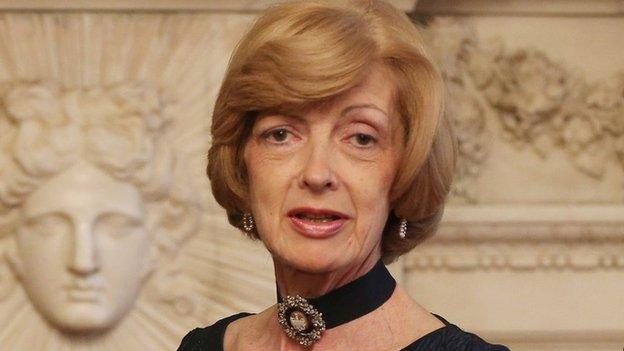Abuse inquiry head Fiona Woolf defends Lord Brittan links
- Published
Fiona Woolf told committee chairman Keith Vaz she wanted her behaviour to be regarded as ''open and transparent''
The head of the public inquiry into historical sex abuse has said she wants to "lay to rest" speculation over links with ex-home secretary Lord Brittan.
Lawyer Fiona Woolf disclosed, external on Tuesday that she had dined with Lord Brittan and his family five times since 2008.
Lord Brittan was home secretary in 1984 when ministers were handed a dossier on alleged high-profile paedophiles.
But Mrs Woolf told MPs that the peer was "one of thousands of people" she knew and was not a "close associate".
No 10 offered its support to Mrs Woolf, saying it was "confident of her ability to do the job".
Mrs Woolf was appointed after the home secretary's original choice for the role, Baroness Butler-Sloss, stepped down after victims' families expressed concerns about her independence.
Her late brother Lord Havers was attorney general at the time allegations about high-profile paedophiles were passed to ministers by the late Conservative MP Geoffrey Dickens.
The dossier was considered by Home Office officials in 1984 and handed to the police but no action was taken and the information has since disappeared.

Mrs Woolf had dinner with Lord Brittan and his wife on five occasions
Lord Brittan has insisted that the proper procedures were followed.
Appearing before the Home Affairs Select Committee, Mrs Woolf faced questions about her links with Lord Brittan after she revealed that she lived in the same London street as the Conservative peer and had invited him and his wife to dinner on three occasions.
Mrs Woolf, current Lord Mayor of London, also revealed she had two dinners at the Brittans' house between 2008 and 2012.
She also disclosed that she sat on the advisory body of CityUK, of which Lord Brittan has also been a member, and had had a coffee with Lady Brittan on a "small number of occasions".
'Systemic failures'
Mrs Woolf told MPs she was aware of "speculation gaining traction on social media" about her links with the Brittans and she wanted to "go the extra distance to make sure I have dug out every possible connection with someone who is essentially one of thousands of people I know in the City".
"Do I have a close association with them (the Brittans)? The answer is no," she said.
The dinners were a "long time ago", she said, and were designed to help "build her City network" and discuss issues such as Europe's relationship with China and the strategic outlook of major firms.
She added: "Let us remind ourselves that this is not an inquiry about Lord Brittan but about hundreds of institutions and frankly thousands of systemic failures."
The BBC's home affairs correspondent Tom Symonds said Mrs Woolf had insisted she was not a member of the establishment but acknowledged that she must convince the public and victims of abuse that this was the case.
Labour MP Simon Danczuk, who campaigned for the inquiry, told the BBC he thought Mrs Woolf should resign.

Fiona Woolf giving evidence to MPs on the Home Affairs committee
He told BBC Radio 4's The World at One: "I don't know what world she inhabits but where I come from if you've been to dinner at somebody's home and vice versa then you're relatively close - you'd consider them friends."
He accused the Home Office of a "total error of judgement". He said: "One mistake is forgivable... to make the same mistake twice looks like they're out to protect Leon Brittan.
"I don't buy the view that you can't choose someone to chair this inquiry who is not connected to Leon Brittan and yet the government seem to have been insistent on choosing chairpeople who are very much establishment, very much connected to people involved."
It also emerged on Tuesday that Mrs Woolf will not start working full time on the inquiry until she steps down from her role as Lord Mayor of London next month.
While admitting she did not have a background in child protection, she said she had wide-ranging legal and corporate experience and the ability to keep the inquiry "focused".
Mrs May has outlined the terms of reference for the inquiry, which was triggered by allegations of child sex abuse by celebrities and public figures working in the media, politics and other walks of life.
The inquiry is to examine the conduct of almost all the major institutions in public life - including Parliament, the police, political parties, churches and schools - and how they responded to allegations of child sexual abuse.
Public hearings
Mrs May said it would "challenge institutions without fear or favour, in order to get to the bottom of this issue and stop it from happening again".
The inquiry will publish its initial report by the end of next March. Although it will not have the power to instigate criminal prosecutions all allegations of abuse will be passed on to the police.
Mrs Woolf will head a panel including child abuse experts and at least one victim of abuse, further details of which have also been announced. , external
She told MPs that the inquiry, which will hold public hearings, would "ask awkward questions" and would seek the power to compel witnesses if necessary.
She said there had been "inquiry after inquiry" into child abuse in the past and she hoped that this one would "make the difference" to victims of abuse and their families.
- Published11 September 2014
